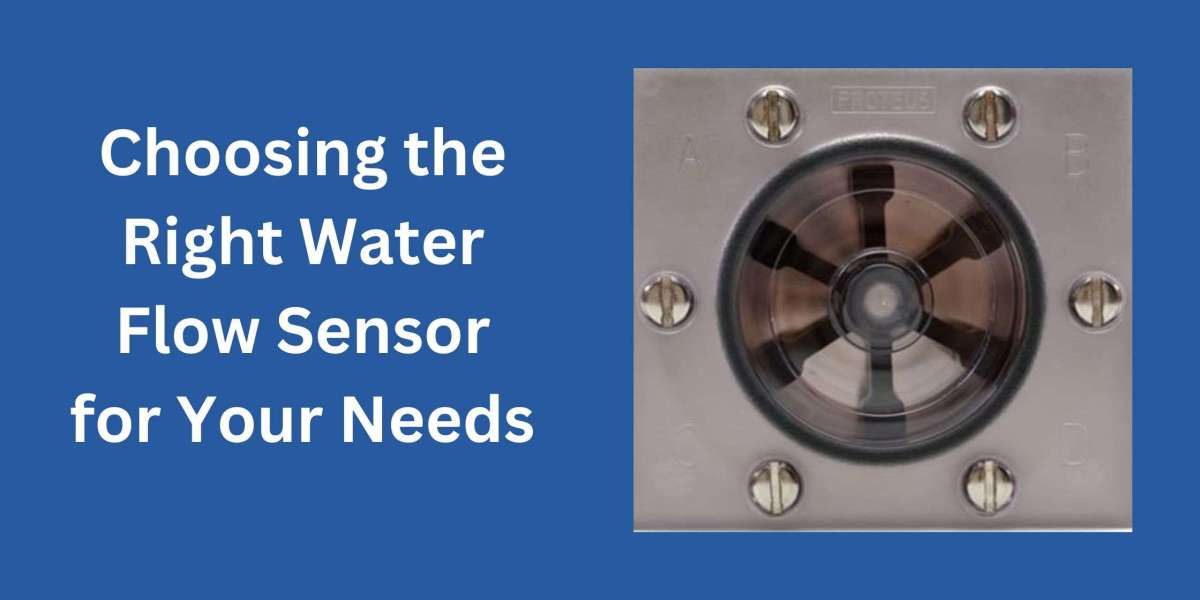Water flow sensors are crucial in various industries, ensuring water systems operate efficiently and safely. Whether working in industrial, agricultural, or municipal applications, selecting a suitable water flow sensor is essential for maintaining reliable water flow measurement and control. With so many available options, it can be challenging to determine which water flow sensor switch is best suited for your needs. In this guide, we'll explore how to choose the ideal water flow sensor switch and discuss the key elements you should consider before purchasing. We'll also introduce Proteus Industries Inc., a trusted company that manufactures high-quality water flow sensor switches, including their innovative solutions for different applications.
Understanding Water Flow Sensors
A water flow sensor is a device that measures the rate of water flow within a pipe or system. It provides accurate data to control the flow and helps monitor water usage, detect leaks, and prevent system failures. These sensors are commonly used in applications ranging from home plumbing to large-scale industrial water management systems. The water flow sensor switch is critical to this system, ensuring the water flow is within safe and functional limits.
Critical Considerations for Selecting a Water Flow Sensor
When selecting a water flow sensor switch, it is important to evaluate several key factors that will determine the sensor's performance and compatibility with your system. These include flow rate range, operating environment, material compatibility, accuracy, and installation requirements.
- Flow Rate Range: The first step in choosing the right water flow sensor switch is understanding your system's flow rate requirements. Some applications require low-flow sensors, while others need high-flow capabilities. Ensure that the sensor you choose can handle the maximum expected flow in your system without causing any inaccuracies or operational failures.
- Operating Environment: Another critical consideration is the sensor's ability to function reliably in various environmental conditions. Some sensors are designed to operate in extreme temperatures, high pressure, or corrosive environments. Consider the specific conditions of your application, such as the temperature and pressure ranges and the presence of chemicals or abrasive materials in the water.
- Material Compatibility: Water systems are often made of different materials, including stainless steel, PVC, and other alloys. Your water flow sensor switch must be compatible with the material of the pipes and fittings in your system. Proteus Industries Inc. provides sensors crafted from high-quality materials to guarantee enduring performance, even in challenging environments.
Proteus Industries Inc.: A Leading Manufacturer of Water Flow Sensors
Proteus Industries Inc. is a leading manufacturer of innovative water flow sensor switches. Known for its high-quality metering and flow switches, the company specializes in producing devices that offer unmatched precision and reliability.
Proteus' water flow sensor switches are engineered with advanced technology to provide accurate flow measurements, improving system management and efficiency. Their metering flow switches, such as the Model 800, offer exceptional performance in applications requiring continuous water flow monitoring.
Installation and Calibration of Water Flow Sensors
Correct installation and calibration of water flow sensors are essential for accurate measurements. Follow these steps for optimal installation:
- Positioning: Ensure the sensor is installed at the appropriate point in your system, ideally upstream of any disruptive flow elements.
- Calibration: Most sensors require calibration according to manufacturer specifications. This ensures reliable readings over time.
Advantages of Using High-Quality Flow Sensors
High-quality flow sensors provide several benefits:
- Efficiency: Improved flow monitoring translates to efficient use of resources.
- Safety: Protects systems from potential issues due to irregular flow rates.
- Cost Savings: Reduces wear on system components, lowering maintenance costs.
Water Flow Sensor Switch Materials and Durability
The materials used in water flow sensor switches vary depending on the application. Stainless steel, for example, provides excellent durability and opposition to corrosion, making it ideal for industrial settings. Proteus Industries Inc. uses high-quality materials to ensure their flow sensors can withstand demanding conditions.
Conclusion
Choosing the right water flow sensor switch for your needs is an important decision that can impact the efficiency and reliability of your water systems. Proteus Industries Inc. offers a wide range of high-quality sensors designed to meet the needs of various industries. Whether you need a mechanical, electronic, or ultrasonic sensor, Proteus' innovative solutions ensure precise flow measurements and dependable performance. By considering flow rate, operating conditions, and material compatibility, you can select a water flow sensor switch that best fits your system's requirements.
FAQs About Water Flow Sensors
1. What is a water flow sensor switch?
A water flow sensor switch is a device that measures the flow of water through pipes or channels and controls the flow to maintain a desired rate.
2. How does a water flow sensor work?
Water flow sensors typically measure water flow using mechanical, ultrasonic, or magnetic technology. The sensor converts the flow rate into an electrical signal for monitoring and control.
3. How do I know which flow sensor suits my system?
Consider your system's flow rate capacity, environmental conditions, and material compatibility. Proteus Industries Inc. offers expert guidance to help you choose the correct sensor.
4. Can I use a water flow sensor switch in harsh environments?
Many water flow sensors are designed to perform well in extreme conditions, such as high pressures, temperatures, or corrosive environments. Proteus Industries Inc. provides sensors built explicitly for such conditions.
5. How accurate are water flow sensor switches?
The accuracy of a water flow sensor depends on the technology used. Electronic sensors, such as those offered by Proteus, tend to provide more precise measures than mechanical sensors.






